
In showbiz, as with life, ya gotta have friends.
Just ask Fab Filippo and Bilal Baig, the co-creators and producers of the new sitcom Sort Of. The series debuts on HBO Max in the United States on November 18.
For Filippo, the show signifies a crossover of sorts. For most of his career, audiences have known him as an actor with recurring roles on Buffy the Vampire Slayer, Save Me and the US version of Queer as Folk, in which he played the upbeat violinist Ethan, the sometime boyfriend of Justin (Randy Harrison). For Baig, Sort Of announces their arrival as an on-camera actor. The trans-femme Pakistani-Canadian performer has already enjoyed a successful stage career as an actor and playwright, with their play Acha Bacha debuting in 2018. After a friendship developed between the pair (more on that in a moment), they decided to collaborate on the new series.
Sort Of follows the bumpy journey of Sabi (Baig), a genderfluid Millennial living in Toronto and working as a nanny for a wealthy family. Faced with relationship woes and an ungrateful employer, Sabi dreams of leaving town with their best friend 7ven (Amanda Cordner) to run away to the queer Mecca of Berlin. A sudden accident, however, throws Sabi’s life into even more upheaval. Sabi suddenly must face a choice of following their dreams, or taking on the role of parent to two children they love.
How about we take this to the next level?
Our newsletter is like a refreshing cocktail (or mocktail) of LGBTQ+ entertainment and pop culture, served up with a side of eye-candy.
We meet Filippo and Baig in the quiet courtyard of a local coffee shop in Toronto during the city’s famed International Film Festival. The pair giggle and cavort together sitting across from one another at a wooden table. We join them there, ginger tea in hand, all of us thrilled to be doing an in-person interview, to chat about the show and its unlikely origins.
Sort Of lands on HBO Max November 18.
So the two of you met in an acting class?
BB: In a play. We were both acting in a play.

So how did the conversation about I want to make a show about a non-binary Pakistani person living in Toronto begin?
BB: Yeah…that’s not how it happened at all.
[Laughter]
BB: We were both working on our separate writing projects while acting in this play. I Googled everybody in the cast and so I knew about Fab’s TV work. It was sort of after the show had ended that Fab had offered what could it be like if we created something together? For me, I’ve always been interested in the reach that TV can have–entering people’s homes, rather than going to the theatre. People in my community typically don’t go to the theatre because it’s too much work.
Ok…
BB: Then, when we started talking, I thought if we did something together, where are you in the story? Where am I? Where are our parts? So I asked Fab. He went away, came back and started talking about looking at the show and investigating every character’s transition. They’re all in transition. That is something that I do think applies to every human being. Our world doesn’t see transition equally. I have a lot of feelings about why. So I just loved hearing that. It was the first time I heard the word come out of a cis person’s mouth. Through that, the character of Paul emerged. That’s when it started to feel like a world was being generated. It was us together asking who are we together.
Fab, what kind of reservations did you, a straight, cis man, have about doing a project like this that’s so unapologetically queer?
FF: It’s interesting. I think the way we envisioned the show originally was very intersectional. Sabi is a nanny for a family, so it felt like something we could build together. It was both of our lenses we kept checking in with as we were writing together. So that’s how I always just saw the show. Its funny–we were doing an interview with someone that knows me from a thousand years ago. He said, “How do you define yourself, Fab?” And nobody had ever asked me that. I don’t mean it to sound like a justification, but there is a big element of queerness in my life. When I was a teenager and started acting, it was at the queer theatre in Toronto. I had mentors, all of whom were queer. They opened these worlds up to me–art, literature, things I had not been exposed to.
Sure.
FF: So I never felt like the lines between Bilal and I were ever that hard and fast. I recognize that their experience and my life experience are totally different. But I don’t think we could have had this creative connection if I had not had that in my past.

What’s the writing process like for you, collaboratively?
BB: Well even before we were in the writer’s room, we worked on creating a sizzle. That was really our first time writing together. It just felt like a lot of talking, in terms of getting a sense of the world and who the characters are. Typically, one person does a pass. The other person does a pass. In the writer’s room, that was always really great to work with other voices and perspectives who are leaning into what this world is. When we first started out, we were sitting side by side working together. But that happened less over time.
Related: Killer clowns, closeted kids and cross dressing writers: What to Watch Toronto Film Fest edition
FF: Yeah. I think it was a kind of–can I say magical? It was really unique. We never argued creatively. We really respect each other’s voice. I ask questions about Bilal’s lens, as well as the way they would express something as a writer. The main difference between us is that I have thrown more spaghetti against the wall than Bilal has. So sometimes my experience comes into play. But often, I’ll be surprised by things I assume won’t work, and Bilal’s like oh no, let’s try it. And that extends to the writing room as well. Jenn Engels, Nelu Handa, Ian Rashid…what happens when you share personal things with the bigger room is that you go through another transition of turning it into a bigger machine. So Bilal and I ran the room together and we’d check in with each other regularly. We put work into our relationship.
How does working on a show like this change your relationship?
FF: Well Bilal is insufferable.
[Laughter]
BB: Yeah, I’m a big diva. How does it change? I think it’s so much about time put in. I feel like I know Fab so much better. Beyond the writing, I have a sense of Fab’s personal life. Our communication styles–we know how to read each other. We know when an idea isn’t totally landing. Those are the things I’ve loved. At the start, we were just trying to find it. Now, after two years, there’s more comfort for me.

FF: I feel like 99% of the time, I know if Bilal is going to like something now. I don’t ever assume it, but I feel it. And I’m usually right. The other difference is that when we split off. Their job now is to be the face of the show, and that’s a whole other thing. I’ve done that, so I can help Bilal get through that gauntlet. Going into the second season, it’s interesting too: now I feel like our considerations–we never had to run a team. So we’ve sort of stumbled our way through it, God bless our team. In the past, we just had to make our own little things. Now, as the show goes into next season, we want to be able to go we’re running a scene now. How do we make sure everyone is contributing? I feel like we did a good job in Season 1, but we’re also talking about leadership here.
That’s something I don’t think we talk about enough, not just in showbiz, but in all industries. The skills to do a job are one thing, but leadership skills are another. And some people have no business leading.
BB: And you add the pandemic into that…
Oh yes. As a character, Sabi is always trying hard to fit in somewhere. How does that reflect your own experiences? What are you hoping to say about intersectionality and evolving identity with the show as a whole?
BB: I’ve seen all eight episodes several times now. One thing I love about Sabi’s journey, in particular, is that it feels like one could say they just budge a little bit by the end of the episodes. But what that budge does is that it cracks open a whole world of possibilities. That’s what I’m turned on by. Our journeys can be really small, subtle. When I think about bringing myself to the work, that’s what this is all about for me. It hasn’t been a fast, rapid, clear defined journey. It’s been slow. Maybe I think I’m this for a little bit. Then I’m that. Or maybe I’m both. It’s important for Sabi to have all these different worlds because that informs who they are becoming and who they want to be.
Well and that’s the title of the show, right? Sort Of: I’m not quite at point A or point B. But I’m kinda there.
BB: Yeah.
The other element I want to ask about: I had a hard time thinking of another show with a Pakistani lead. Simply because I’ve had so little exposure–and I’m guessing most of our readers are in the same boat–how are gender fluidity and sexual orientation regarded in Pakistani-Canadian culture? How accepted is being queer?
BB: For a very long time I thought I was the only person in the world who was feeling such intense things around loneliness and identity. Quickly I found out, especially in Toronto or other major cities, there’s a real sense of community among queer Muslims, trans Muslims in particular. Honestly, I just googled to find other people and organizations. I think growing up in the home I did, I always felt like an outsider. Also, the way my family communicates is basically non-existent.
[Laughter]
BB: So it never felt like a place I could totally thrive. So I looked outward. I know a lot of people in my life now who identify as I do, or similarly. That was one thing I had to discover. I didn’t think anyone else in the world felt as I did. But I think there actually are. And I think the world is changing. People are examining their own relationships with gender and faith. Those relationships are changing. But on a larger level, it’s a conversation within the community. I think queer and trans-Muslims are finding within the Koran language that works for them that says God loves us all. That is helping them marry faith and queerness. So, it’s complicated. I think we find our ways. I feel pretty at ease with myself. If you can’t find it in your own family, there is a community out there.

Fantastic. And that doesn’t sound all that different than what so many of us went through with Christianity.
FF: It’s interesting. Hearing that made me think of Ruffo, Sabi’s mom is wrestling with their gender all season. It’s interesting that sexuality never came up. I wonder if it lands for her later when she sees Sabi with a boy.
BB: Right.
A lot of this show deals with the deficiency of labels—how they don’t really apply anymore. This is a conversation I think we’re having more broadly among queer people right now. Labels, at the same time, serve a practical purpose. What are you trying to say about labels with the show? What is your experience personally with labels–how are they beneficial, how are they not?
BB: I think something that really works for me, and I think lives in the show, is the fluidity of labels. Maybe we can get to a place where if you feel like one thing one day, you can have that. If it changes 30 seconds later, that’s also ok. One thing I got to talking about with Amanda who plays 7ven, is this idea of who gets to claim queerness, and when does that disappear when your life starts to look a certain way? And 7ven, who is beyond labels, never wants to be boxed in any way. What I want more of in the world is that openness. Because identity is constantly shifting, labels should be able to be fluid too. There’s a danger in saying “If I claim one thing for myself, does that mean only that thing forever?” I think that’s a big commitment to make. I’m too young to claim some of these things.
For you Fab, because you’re so prolific in your career, what kind of satisfaction do you get from writing and producing that you don’t get from acting?
FF: I think there’s a certain everyday satisfaction. I just really need to be engaged. As an actor, I never felt engaged enough. It was more like I wait until I have to do my thing. I’m a restless person, and I love having too much to do. I feel in my element.
We call that workaholic where I come from.
FF: I’m willing to claim that. I just love being engaged. Your job when you’re showrunning or directing is to focus the lens. You see everything everyone is bringing and try to put the right stuff in there. It becomes less about what you have to say and more about what everyone else has to say. Also, like I say, growing up in the queer theatre, my mentor was a guy named Ken McDougal, who died of AIDS. He was always pushing boundaries–taking social issues and changing them into entertainment in a way that didn’t feel preachy. What I love to do is take all these ideas that are maybe on the margins or not looking at and finding a way to make it move you, to make you laugh. That just really jazzes me.
Sort Of debuts on HBO Max November 18.


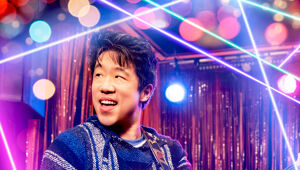
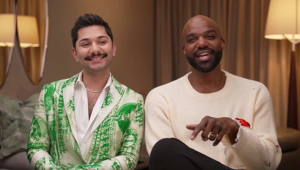
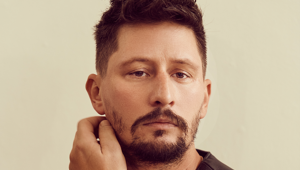
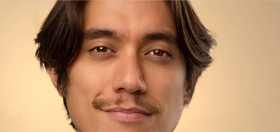

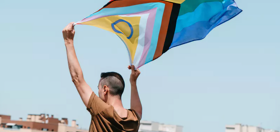
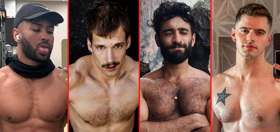
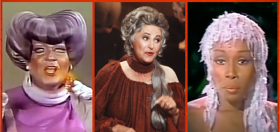




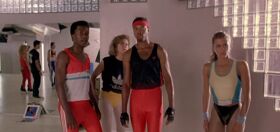
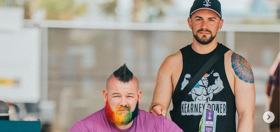
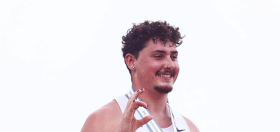

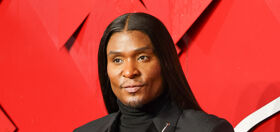
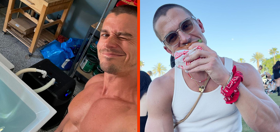
THAT Steve
I sort of want to see this.
CatholicXXX
I doubt this gets a second season. it was cute and the mc wasn’t entirely self absorbed like many other shows.